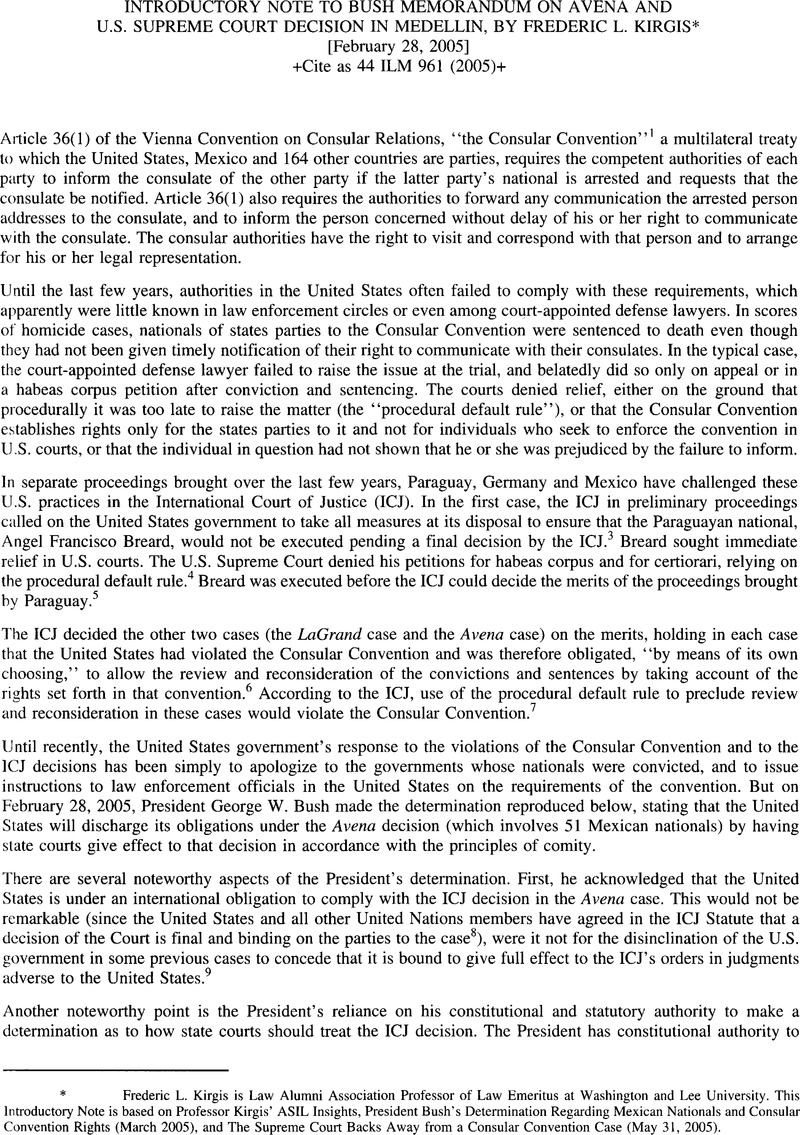No CrossRef data available.
Published online by Cambridge University Press: 27 February 2017

1 21 U.S.T. 77, 596 U.N.T.S. 261.
2 Case Concerning the Vienna Convention on Consular Relations (Paraguay v. United States), 1998 ICJ Rep. 248, 37 ILM 810 (1998). See ASIL Insight, International Court of Justice Orders United States to Stay Execution of Paraguayan National in Virginia (April 1998).
3 Breard v. Greene, 523 US 371, 118 S.Ct. 1352 (1998).
4 See Agora: Breard, 92 AJIL 666 (1998).
5 LaGrand Case (Germany v. United States), 2001 ICJ Rep. 466, 40 ILM 1069 (2001); Case Concerning Avena and OtherMexican Nationals, 2004 ICJ Rep. 128, 43 ILM 581 (2004). See ASIL Insights, World Court Rules Against the UnitedStates in LaGrand Case Arising from a Violation of the Vienna Convention on Consular Relations (July 2001), and Consular Notification and the Death Penalty: The ICJ's Judgment in Avena (April 2004).
6 LaGrand case, ¶ 90; Avena case, f 113.
7 ICJ Statute arts. 59 & 60.
8 In the Military and Paramilitary Activities case (Nicaragua v. United States), 1986 ICJ Rep. 14, 25 ILM 1023 (1986), the United States did not participate in the proceedings on the merits after the Court had rejected the U.S. objections to its jurisdiction, and did not concede that it was bound by the Court's final judgment.
9 See American Insurance Ass'n v. Garamendi, 539 US 396, 123 S.Ct. 2374 (2003); Crosby v. National Foreign Trade Council, 530 US 363, 120 S.Ct. 2288 (2000); Zschernig v. Miller, 389 US 429, 88 S.Ct. 664 (1968); United States v. Pink, 315 US 203, 62 S.Ct. 552 (1942); United States v.Belmont, 301 US 324, 57 S.Ct. 758 (1937)
10 See Shelley v. Kraemer, 334 US 1, 68 S.Ct. 836 (1948), and see the Zschernig and Pink cases, supra note 10.
11 Breard v. Greene, 523 US 371, 376 (1998).
12 After the ICJ had decided the Avena case and after the President had made his determination that state courts should give effect to the ICJ's decision, Secretary of State Condoleeza Rice notified the United Nations that the United States was withdrawing from the Convention's Optional Protocol, whichsupplied the basis for the ICJ's jurisdiction over the United States in the Avena case. Under the Vienna Convention on the Law of Treaties, article 56(2), the withdrawing party would have to give twelve months’ notice. The United States is not a party to Vienna Convention on the Law of Treaties, so it might not have to give the full twelve months’ notice, but it would have to allow a reasonable time to elapse before its withdrawal becomes effective.
* This document was reproduced and reformatted from the text appearing at the following website:<http://brownwelsh.com/Archive/2005-03-10_Avena_compliance.pdf>(visited June 2, 2005)